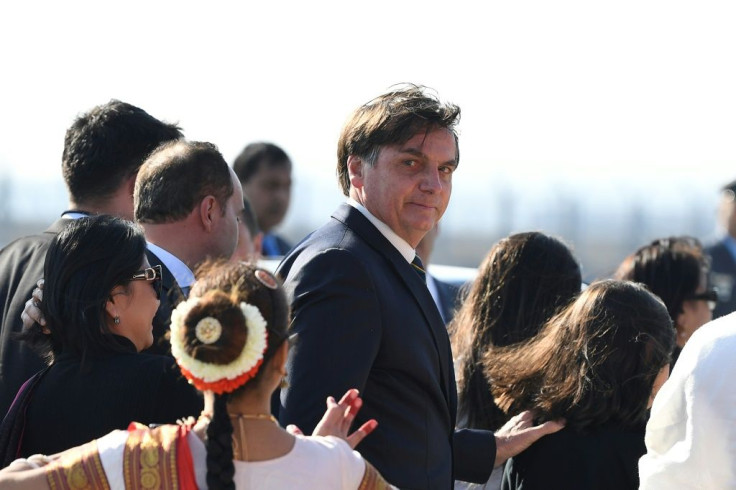Brazil, India Sign Flurry Of Deals As Bolsonaro Visits Modi In New Delhi

KEY POINTS
- Brazil and India are two of the largest emerging economies in the world
- Bilateral trade between the two countries are about $8.2 billion
- Bolsonaro and Modi have many similarities
Brazilian President Jair Bolsonaro was the guest of honor at India’s Republic Day celebrations over the weekend as the leaders of Brazil and India met to sign a series of trade, investment and security deals.
The agreements between two of the most dynamic emerging economies in the world will encompass oil and gas, mining and cybersecurity, among other sectors.
Bolsonaro, making his maiden voyage to India, was accompanied by his daughter Laura, eight ministers, four members of the Brazilian Parliament and various businessmen.
Republic Day honors the establishment of India's constitution in 1950.
Bolsonaro, a highly controversial leader often called “far right” by his critics, met with India’s Prime Minister Narendra Modi – an equally controversial head of state -- at the presidential palace. Bolsonaro also visited the Swaminarayan Akshardham temple complex in Delhi.
“The visit of President Bolsonaro is an extremely important visit. It will be an opportunity to reenergize our strategic partnership and take it forward in a focused manner,” Secretary (East) in the External Affairs Ministry Vijay Thakur Singh said late last week.
Bolsonaro was also the first Brazilian head of state to visit India.
“Your visit to India has opened a new chapter in bilateral ties between India and Brazil," Modi told his counterpart.
Bilateral trade between Brazil and India amounted to $8.2 billion in fiscal 2019, but both sides expect this volume to grow in the coming years.
“Given the complementarities and synergies that exist between our two countries, we believe the potential is much more,” said Vijay Thakur Singh, a senior Indian foreign ministry official. “We have a very ambitious agenda.”
India’s principal exports to Brazil include agro-chemicals, synthetic yarns, auto components and parts, pharmaceuticals and petroleum products. On the other side, Brazilian exports to India comprise crude oil, gold, vegetable oil, sugar and bulk minerals and ores.
Brasília reportedly wants to sell its Embraer jets and its space technology to India.
Moreover, India invested about $6 billion into Brazil in 2018 -- primarily in the information technology, pharmaceutical, energy, agri-business, mining and engineering sectors. Brazil poured in about $1 billion into India that year -- primarily in automobiles, information technology, mining, energy and biofuels sector.
However, Brazil and India are ensnared in some trade disputes. For example, Brazil, Australia and Guatemala and the World Trade Organization started a probe last year into India’s sugar subsidy program, which Brasília alleged has helped create a global sugar glut and depress prices.
As such, Indian sugar farmers protested Bolsonaro’s visit.
Brazil and India are both members of the BRICS economic bloc.
The Financial Times commented that India is one of the few major nations in the world that would warmly embrace Bolsonaro. (In contrast, a trip by Bolsonaro to New York last May was cancelled following an outcry).
“President Bolsonaro is committed to building this relationship and we would be warmly welcoming him as an honored guest,” said Thakur Singh.
A spokesman for Bolsonaro said: “The visit is part of the process of economic reforms, modernization and opening up of the Brazilian economy, as well as recognition of the importance of Asia to Brazil.”
Bolsonaro and Modi have both been accused in their respective countries of ignoring environmental concerns, expressing hostility to minorities, seeking to suppress the media and of undermining democracy.
“Unfortunately, among the characteristics that bring both countries together is the conservative orientation of the two governments,” said Maria Antonieta Lins, an expert on international relations at the University of Sao Paulo. “As much as the trip is being heralded as a friendship between two great democracies, which is true, we have recent examples of intolerance in both.”
Oliver Stuenkel, a professor of international relations at the Getúlio Vargas Foundation, commented that for Bolsonaro, his visit to India is “part of a reality which is very new to Brazil, which is that the Brazilian president may not have a bilateral [visit] with a big European country during his presidency. [India] is an easy visit for Bolsonaro [because] the Indians will never come and say: ‘We’re so concerned about the way you’re treating journalists. [India] is a bit of a safe space.”
Aurobindo Xavier, president of the Lusophone Society of Goa, a group that promotes Portuguese culture in India, wrote that both Bolsonaro and Modi have strong nationalist ideologies and their emergences were partly driven by religious fervor.
“Modi looks like a politician [who has] tested well in the exercise of power, with philosophy and pragmatism,” said Cristovam Buarque. “Bolsonaro has a militaristic [posture] and has gone through political mandates without [the] political practice of proposition and negotiation. Modi has traces of a great statesman, Bolsonaro seems to lack this.”
Buarque is a former Brazilian Minister of Education
Rosimar da Silva Suzano, the former General Consul of Brazil in Mumbai, commented that both Bolsonaro and Modi are “conservative leaders who have tapped into popular disillusion with the unfulfilled promises of social democracy. In this sense, both leaders are a product of their time and represent a change of course in two countries that are relevant regional actors.”
© Copyright IBTimes 2025. All rights reserved.




















